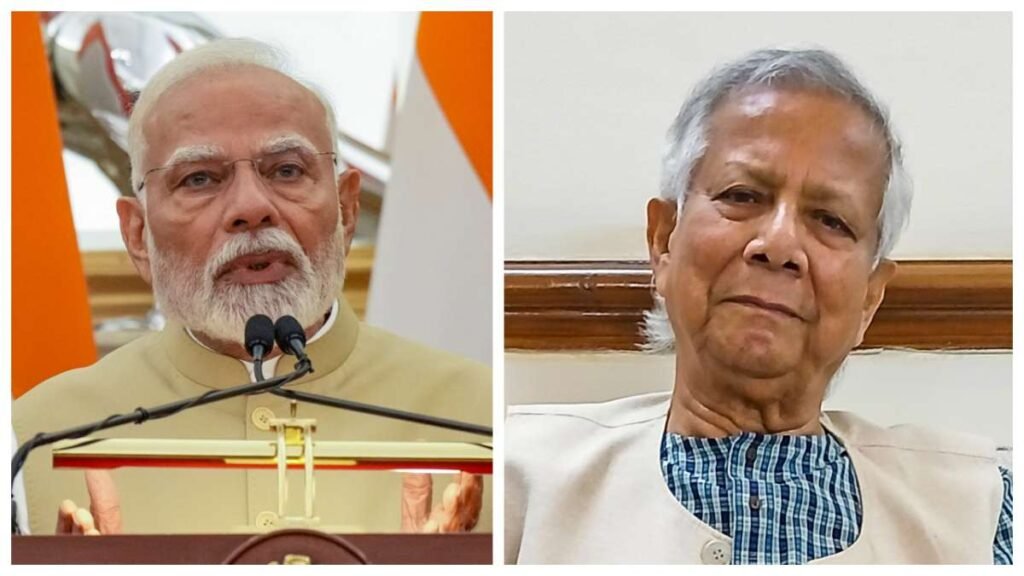Bangladesh has requested a meeting between its interim government’s chief adviser Mohammad Yunus and Prime Minister Narendra Modi on the sidelines of the BIMSTEC Summit in Thailand. If it happens, this would be the first-ever meeting between the two leaders following Sheikh Hasina’s ouster.
India and Bangladesh may be looking at a thaw in strained ties following the fall of Sheikh Hasina’s government and her fleeing the country with Dhaka indicating a first-ever meeting between Prime Minister Narendra Modi and Mohammad Yunus, the chief adviser of the neighbouring country’s interim government.
The meeting is likely to take place in Thailand on Wednesday, on the sidelines of the 6th BIMSTEC Summit (Bay of Bengal Initiative for Multi-Sectoral Technical and Economic Cooperation), during which PM Modi will also hold talks with his Thai counterpart Paetongtarn Shinawatra.
Khalilur Rahman, the High Representative to the Chief Adviser on the Rohingya issue and other key priorities stated in an interview with the Dhaka Tribune that Bangladesh has requested a meeting between the two leaders and remains “reasonably hopeful” about its prospects.
Speaking to reporters, Rahman expressed confidence, noting a “high possibility” of the meeting, according to the newspaper. Additionally, the state-run BSS news agency, citing an unnamed source, reported that discussions between the two leaders are expected to take place during the summit.
Meanwhile, New Delhi has not ruled out the possibility of the meeting, stating that Dhaka’s request for a meeting between the two leaders is being looked into.
In another hint at mending ties, PM Modi wrote to Yunus on March 26 on Bangladesh’s National Day, calling for the need to strengthen bilateral ties with a mutual understanding of each other’s concerns.
In a message to the people of Bangladesh, Modi wrote, “This day stands as a testament to our shared history and the sacrifices that have shaped our bilateral partnership. The spirit of Bangladesh’s Liberation War remains a guiding force in our relationship, which has expanded across various sectors, bringing tangible benefits to our people.”
“We remain committed to deepening this partnership, guided by our shared aspirations for peace, stability, and prosperity, and built on mutual sensitivity to each other’s interests and concerns,” he stated in his message sent on Wednesday.
Slump in India-Bangladesh ties and violence against Hindus
Since the interim government led by Yunus took charge following the ouster of then-Prime Minister Sheikh Hasina in August 2024, relations between India and Bangladesh have deteriorated, with India expressing concerns over rising violence against Hindus and the growing influence of hardline Islamist groups in Bangladesh. Several incidents emerged of temples getting vandalised and targeting of Hindu houses and businesses.
The arrest and jailing of former ISCKON monk Chinmay Krishna Das on purported “sedition charges” also worsened the ties and triggered backlash in India.
Yunus’ remarks on Northeast during China visit
During his visit to China last week, Yunus urged Beijing to expand its economic presence in Bangladesh, controversially suggesting that the landlocked nature of India’s northeastern states could present an opportunity.
Meeting with Chinese President Xi Jinping, Yunus signed nine agreements with Beijing and remarked, “The seven states of India, the eastern part of India, are called the seven sisters. They are a landlocked region of India. They have no way to reach out to the ocean.”
Positioning Bangladesh as the “only guardian of the ocean” in the region, he argued that this geographical advantage could facilitate greater economic integration with China.
His remarks surfaced on social media on Monday, sparking sharp criticism from Indian political leaders across party lines, who condemned his statement as “shameful” and “provocative.”
In response, Khalilur Rahman clarified that the chief adviser’s comments had been misinterpreted. “He made the statement with honest intentions. If people interpret it differently, we cannot prevent it,” he said at a media briefing in Dhaka.
Bangladesh will take over as the chair of BIMSTEC at the summit. Rahman said Yunus’s remarks in China about India’s landlocked north-east states was made with “honest intentions”.
